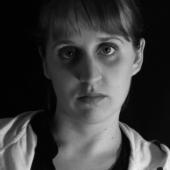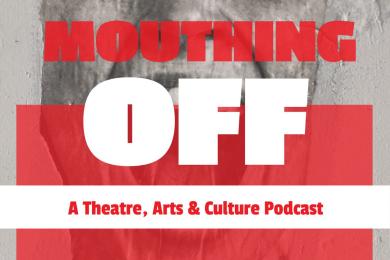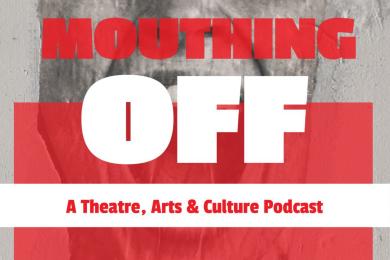The Importance of Trying with Gemma Irish

For Gemma Irish, the play began when her parents heard a story on KFAI. “My parents are always like, ‘You should write a play about this.’ And I’m like, okay, cool,” Irish said. “But this one caught my interest in a different way.” The story followed dissent and violence in the Twin Cities co-op community in the 1970s. As Irish tells it: “In 1976, hippies were smoking a joint and sitting on bulk bags of beans and flour in the warehouse, and armed Marxists came, and there was an altercation and Marxists took over the warehouse. I mean, that’s crazy.”
Irish grew up going to Twin Cities food co-ops with her parents, and this was not the kind of history she expected to learn about the movement. “I got really interested in how this group of people, who I considered to be almost ineffectively laid back and comically non-violent could be in a war with each other. A literal war! With battles!”
This is Irish’s first play based on historical events, and she’s still deep in the research process. “The blessing and the curse of the co-op wars is that almost everyone who was involved is still living, so you have many different versions of these stories. And considering that they’re all still living and it was such a big deal within this niche community, there is surprisingly little documentation about it.”
With so many divergent personal narratives to go through, it can be difficult to objectively sort out what happened, but that is not a deterrent to Irish. “One the one hand, I feel as if I do owe some allegiance to the quote-unquote truth, to the facts, but on the other hand, it’s impossible to know what the facts truly are,” Irish said. “I kind of don’t believe in objectivity.”
Allegiance to the Facts
Irish studied poetry in college, which informs her approach to writing from history. “Poetry is not, like, true, but it’s usually based on an impulse or a moment or something specific. I used to have a great poetry teacher who said, you owe no allegiance to the facts. If your poem is based on something, but it turns into something else, that’s okay. But I think plays are even further in that direction.”
At this point in her process, Irish is still working on shaping the arc of her play. “I have to decide on the emotional truth I’m telling, and hopefully that arc will resonate with some of the people who were involved,” Irish said. “I think it’s important to take ownership of this true thing in a way that I would take ownership of a thing I’m just making up, otherwise I’ll never get it out because I’ll be constantly doubting.”
Irish is concerned about the story she will be telling, especially to an audience today. “When am I appropriating someone else’s life-altering event to make a good story?” she asks. “And it’s so easy to make fun of these guys smoking a joint on a bag of beans, who get blindsided by armed Marxists. It’s funny, but it was terrifying for them. It’s such a fine line between respecting the stories that exist and having ownership of them.”
Irish also has an eye toward intersectionality in her piece. “As I’m reading about it, it seems like a lot of college-educated white middle class people, disillusioned after the Vietnam war, distrustful of the government and distrustful of large corporations, who were trying to do what was best for their communities, without actually engaging with their communities in some cases, and I don’t want to recreate that onstage,” Irish said. “I want to find ways of acknowledging in my play that I’m white, I’m middle-class, and my parents are hippies and I have a perspective on this, so it’s not an objective retelling of this thing. This is me filtering it through the last forty years, my background.”
Hindsight as Curiosity
Irish’s background, including her parents’ long history of activism, has fueled her interest in telling the stories of this community. “When I was born, my parents lived in a communal house in Powderhorn. It was a vegetarian household, and my mom used to sneak out of the house for Big Macs, because she really missed eating Big Macs. I mean, they’re delicious,” Irish said. “Even that little moment, that’s a scene. And I want to seem like, I get this, I’m laughing with you.”
Growing up, Irish was sometimes frustrated with her parent’s generation and what she perceived as an overly simplistic and naïve world view. “When I was a kid, our neighborhood co-op folded because no one was really managing the business. They were all just showing up and selling produce at whatever price seemed right that day,” Irish said. “As a type-A person, that drives me a little bit crazy.”
But in researching the co-op wars, Irish has found that there’s much more to the story. “It’s so easy to look back and be critical, and it’s so much harder to be constructive. I hope that I can use hindsight to my advantage, but I hope that hindsight comes across as curiosity and not as judgement.
There’s a lot about their struggle that resonates with Irish today. “This group of people tried something brand new. They tried to exist outside of a system that they felt was screwing them over. That’s great! I work two and a half jobs and I wish I could figure out a way to exist outside the financial and corporate system. But I haven’t found that yet.”
Looking at Now Through Yesterday
Irish is unsurprised that issues around food justice continue to be relevant. “Food is so political. We literally need it to live, so of course it’s one of the most vital things that we fight for.” And by delving into the struggles of the past, Irish hopes to tell a story for those struggling today. “To me this play has always felt like an examination of the present. Here’s a case study, this happened, where are we now?” she said, “And I think, too, it’s important for us not to have to repeat history, for us to see what came before and learn from it and move forward. And recognizing that, this is so cliché but so true, we’re all just human beings doing our very damn best in the moment to figure it out.”
Anchoring in her play in the 1970s also gives Irish a chance to sidestep the audience’s expectations. “Sometimes I think it’s easier to write a play about the past instead of writing a play about the present in this case. People have that little bit of remove and they’re not as defensive and they don’t know all the answers already.”
This year has been stressful for Irish. “To be honest, I’ve been super overwhelmed since January 20th, and I don’t even… I don’t know man,” she admits. But working on this play has been somewhat comforting. “There’s been something reassuring to me in all my research, which is the idea that to exist in a state of struggle is to engage with human existence, that just is what being alive is. And as long as you’re engaging in the struggle, you’re alive.”
“The thing that I admire about the co-op movement is that they stood up and tried. They did something. And it a little bit fell apart and it a little bit exploded, literally, but they went for it! And it gave birth to the rich co-op community we have today.” Irish said. “It is so easy to tear apart other people’s efforts. It is much harder to create something and go: this is the thing I made. I’m trying it, I know it’s not perfect, but I don’t know what else to do.”




